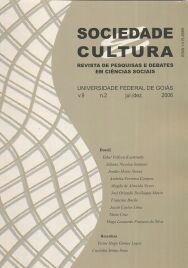O setor de confecção em Goiânia: análise da relação entre trabalho doméstico e trabalho domiciliar
DOI:
https://doi.org/10.5216/sec.v9i2.475Resumo
Resumo: O setor de confecção emprega intensivamente o trabalho feminino, apresenta uma estrutura heterogênea e compreende uma diversidade de técnicas produtivas. Caracteriza-se pelo predomínio de micro e pequenas empresas, pela competitividade e pela sazonalidade da produção, além da presença de relações de terceirização e subcontratação entre empresas de porte diferente ou ligadas a etapas distintas do processo de produção. O objetivo aqui é considerar, no elo mais precário da rede, que envolve o trabalho de costureiras em oficinas de âmbito familiar ou facções subcontratadas, a relação entre trabalho doméstico e trabalho domiciliar sob o prisma das relações de gênero. Partimos de algumas considerações sobre o setor de confecção no Brasil e em Goiás, numa primeira parte, seguida de uma análise com base em pesquisa de enfoque qualitativo realizada em 2005 no bairro de São Judas Tadeu, próximo ao campus II da UFG, em Goiânia, empregando principalmente entrevistas semi-estruturadas com trabalhadoras na área de confecção. Palavras-chave: trabalho doméstico; indústria de confecção; trabalho domiciliarDownloads
Não há dados estatísticos.
Downloads
Publicado
2007-12-05
Como Citar
NUNES, JORDÃO HORTA HORTA; CAMPOS, ANDRÉIA FERREIRA. O setor de confecção em Goiânia: análise da relação entre trabalho doméstico e trabalho domiciliar. Sociedade e Cultura, Goiânia, v. 9, n. 2, 2007. DOI: 10.5216/sec.v9i2.475. Disponível em: https://revistas.ufg.br/fcs/article/view/475. Acesso em: 22 fev. 2026.
Edição
Seção
Dossiê
Licença
Autores/as que publicam nesta revista concordam com os seguintes termos:
- Autores/as mantêm os direitos autorais e concedem à revista o direito de primeira publicação, sendo o trabalho simultaneamente licenciado sob a Creative Commons Attribution License, o que permite o compartilhamento do trabalho com reconhecimento de autoria e da publicação inicial nesta revista.
- Autores/as têm autorização para assumir contratos adicionais separadamente, para distribuição não exclusiva da versão do trabalho publicada nesta revista (ex.: publicar em repositório institucional ou como capítulo de livro), com reconhecimento de autoria e da publicação inicial nesta revista.
- Autores/as têm permissão e são estimulados/as a publicar e a distribuir seu trabalho online (ex.: em repositórios institucionais ou na sua página pessoal) a qualquer ponto antes ou durante o processo editorial, já que isso pode gerar alterações produtivas, bem como aumentar o impacto e a citação do trabalho publicado (veja O Efeito do Acesso Livre).


 Esta revista está licenciada sob a licença
Esta revista está licenciada sob a licença 
